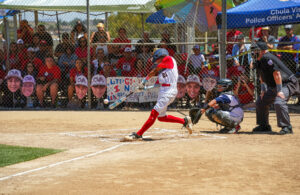The Redemption Of Jeff Carter: Part Two
- By Jeff Duarte
- Updated: January 1, 2015

The 2013 NHL season was cut short due to a player’s strike. Only 48 regular season games were to be played instead of the regular 82. Because of this the season started in what was usually the middle part of the season in January. If any momentum from the Stanley Cup win was lost by Jeff Carter due to the extended break, he did not show any signs of it. Carter finished the season strong with 26 goals, which was fourth overall in the NHL but first overall in the tight defensive Western Conference. Carter also led the entire league with 8 game winning goals to add a cherry on top.
The grind of the season (even though short) took its toll on the defending Stanley Cup Champion Los Angeles Kings and during the first round series against the St. Louis Blues, Dustin Brown suffered a torn PCL in his knee while Drew Doughty suffered a fractured ankle. Both players continued playing despite the injuries but things got worse in the second round against the California rival San Jose Sharks, when face off and penalty killing specialist Jarret Stoll suffered a concussion, putting him out of action. With Doughty and Brown playing with pain, and Anze Kopitar in his biggest career slump at the time, Willie Mitchell out the action the entire season due to a knee injury and buddy Mike Richards later suffering a concussion in the Western Conference Final. The deep leadership of the Kings was now in jeopardy but coach Daryl Sutter wasn’t worried. He knew he had an ace up his sleeve. That ace was the idea and the confidence of expanding Jeff Carter’s role. A role that a younger Jeff Carter wouldn’t have pulled off but the 2013 Jeff Carter was hungry and ready for. The role of a leader.
Carter’s newfound skills proved handy as he and goalie Jonathan Quick were praised by local media at the end of the second round series for their contributions against the Sharks. Carter had been switched from right-wing to Center and was effective in winning face offs against “face off king” and then Sharks Captain Joe Thornton. Carter was also added the responsibility of penalty killing and found success at that too. His giant skating strides were being used to effectively back check and regain puck possession. Instead of just scoring goals, which he still did, he was now playmaking and setting up others as enemy defenders focused solely on him, leaving his teammates open. And if Carter seemed shy and quiet during games, he was now very positively vocal on and off the ice. The difference between the Jeff Carter of old and new was enormous but only noticed by those that were paying close attention to the Kings. Sadly the whole hockey world (mostly those that covered the East) still thought of Carter as the former version despite his current play and results. One person that did notice though was Tampa Bay General Manager and Team Canada Executive Director, Hall of Famer Steve Yzerman.
During the 2013-14 season, Carter’s offensive numbers had somewhat dipped but what many people didn’t realize with the naked eye (but Yzerman did) was that his overall play had not dipped, in fact the opposite was happening. Carter was a product (like the other Los Angeles King players) of coach Daryl Sutter’s unique defensive system so in fact, despite the lower numbers, Carter was playing and being very effective at all the other facets of the game. Skills he showed that most coaches, experts, and analysts had no idea he was even capable of which now included playing on the left-wing as well as playing center, and right-wing with positive results. Being on both the power-play and penalty killing units and taking and winning face offs against top centers the league had to offer.
Carter’s newly founded and well-rounded versatility appealed to Yzerman, who was scouting players for the national Canadian team that was to play at the 2014 Sochi Olympics. Carter made the original list and this didn’t surprise anyone who covered the Western Conference and already had their eyes opened to the new Jeff Carter, but journalists and analyst’s of the east were still shocked at the selection (except for TSN’s Bob McKenzie and Hockey Night in Canada’s Elliot Freidman who praised it).
Before the Olympics, Tampa Bay Lightning sniper Steven Stamkos suffered a horrific on ice accident where the tibia bone of his leg was broken. This had serious repercussions for Team Canada’s plans as they were hoping for Stamkos to be the bullet to superstar Sidney Crosby’s trigger. Plans had to be quickly changed as Team Canada’s brass now looked at Carter to be Crosby’s main trigger man and this ended up not working at all. Canada won their first game 3-1 against Norway but the Crosby and Carter experiment proved unfruitful. Many experts blamed Carter for the failure and had him scratched as punishment for the next game against Austria. Canadian coach Mike Babcock didn’t agree and had other ideas.
The lines were switched for the Austrian game and now Carter instead of being benched, was now skating on a line with Chicago Blackhawks Captain (and rival) Jonathan Toews and San Jose Sharks forward (and other rival) Patrick Marleau. This ended up becoming Canada’s most effective and dangerous line for the rest of the tournament, starting with Carter scoring a hat trick in this game. Sidney Crosby was ineffective with his new line mate Martin St. Louis (even though he did get one assist in the game, on a goal scored by Jeff Carter). The problem from the first game now obviously wasn’t Jeff Carter at all, but with Sidney Crosby and his mysterious Olympic struggles. Crosby struggled throughout the tournament and couldn’t find any chemistry with any other linemates including Pittsburgh Penguin’s teammate and buddy Chris Kunitz. Jeff Carter on the other hand, flourished.
Jeff Carter finished the tournament with the most goals and points by any Canadian forward on the team, over the likes of Crosby, Toews, Kunitz and other stars such as John Tavares, Martin St. Louis, Patrick Sharp, Patrice Bergeron and Jamie Benn. Carter was also the catalyst for setting up LA Kings teammate Drew Doughty for the game winning overtime goal against Finland and setting Jonathan Toews up for what turned out to be the Gold Medal game winning goal against Sweden in the finals. With an Olympic Gold Medal around his neck, a medal that had his fingerprints of hard work and talent all over it, Carter had now silenced (or was silencing) his most harshest critics.
Related Posts
About Jeff Duarte
Born and raised in southern Ontario, Jeff has been enamored with the sport of hockey for as long as he can remember. A musician, a purple belt in Brazilian Jiu-Jitsu and a former amateur boxer, Jeff has many interests but none more important than spending time with his beautiful wife and writing about the enigma, heartbreak and triumph of his beloved Los Angeles Kings.



